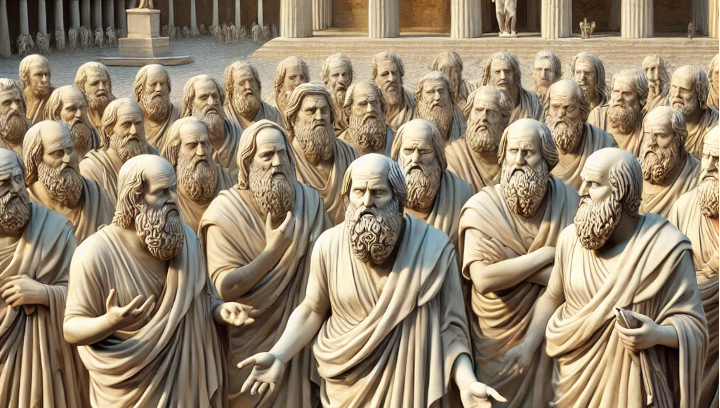
“When I was going to school… I could go read what Aristotle wrote… the problem was: you can’t ask Aristotle a question… As we look towards the next 50 to 100 years, if we really can come up with these machines that can capture an underlying spirit or an underlying set of principles or an underlying way of looking at the world, then when the next Aristotle comes around, maybe if he carries around one of these machines with him his whole life - his or her whole life - and types in all this stuff, then maybe someday after the person's dead and gone, we can ask this machine, ‘hey, what would Aristotle have said’?”
These days, we are all carrying “one of these machines” in our pockets, and they are capable of recording every action we take and every word we utter, so you would think this reality is around the corner: that we could soon interact with digital versions of the next Aristotle, its AI-twins, and have an infinite number of such Aristotle’s at our disposal. Perhaps soon we could also get access to Ricardo-Muti’s AI-twins to ask about classical music, and get tennis tips from Federer’s AI-twins. At work, we could reach out to the AI-twins of any colleague at work and have them answer our pressing questions, without having to book a meeting. On a more personal level, our own grand and great-grand-children could get access to our AI-twins, strengthening our intergenerational bonds for decades to come. Wouldn’t we all like to have been able to probe the minds of our ancestors?
The technology for creating such AI-twins is not too far off. As a case in point, last year, Reid Hoffman (founder of LinkedIn) created an AI version of himself by training an AI model on his writings and speeches in both text and video, and Reid then went on to have an in-depth conversation with this AI-twin, who (sic!) answered his questions quite competently and even used similar gestures and nuances as the real Reid.
Today many tech companies are trying to figure out the right approach to this idea, experimenting to find successful solutions, balancing social norms and expectations, and probing the boundaries of confidentiality and appropriateness. Still, chances are that it will take a little more time for them to find the right magic formula, and so we will not get a whole bunch of AI-twins unleashed out into the world overnight. Rather, these will likely be built step by step over time.
We may see the fastest progress in the corporate world, where the productivity gains from such AI-twins are expected to be immense. We are already seeing AI assistants draft emails for us, and suggest responses to emails we receive, asking us to confirm their draft answer, to just press “Accept” and send. If a colleague asks you a question over email, we could imagine that these AI-Assistants will be able to read your old emails and try to find the right answer. Your company might also give them access to your documents and your Slack messages, so that the AI-Assistant can try to find the right answers, accumulating the knowledge bit by bit, and suggest increasingly better answers. You would just need to review and “Accept”. Admittedly, at that point, we would still be far from a Reid-Hoffman-like AI-twin, and probably still have to draft many an email ourselves. We might even get frustrated at the lack of progress and mock the AI’s intelligence(!) when it makes mistakes. We would probably clamor for better solutions. Well, one thing the industry has learnt is that the sure way to improve AI is to feed it more data. So, perhaps we can ask the AI Assistant to start listening to our Zoom calls and Teams meetings and phone conversations to train itself, in the same way that Reid’s AI -twin trained on recordings of his talks. As the AI assistant absorbs more and more of our interactions and video conversations, it will certainly improve, gathering the latest data and emulating our idiosyncrasies. Soon we would be able to trust the AI to respond on our behalf in our style with our nuances for each correspondent, and we may not even have to check the answers, or press “accept” – Just let this new AI-Agent work for you.. to represent you, in both senses of the word. At that point, it would be safe to say that this AI-Agent would truly be a reflection of you, a shadow of your identity that will only get sharper as it trains on more data. To use Jobs’ words from 1983, it may “capture an underlying spirit”, a sense of your self or your soul, at least your corporate soul.
What about your non-corporate identity - your real soul? If we are to have AI-twins that can act as agents and represent us, taking actions on our behalf, and even talk to our grand children one day, we will have to train it on more and more of our personal data too. However, under the structure of the internet, as it stands today, we have largely delegated control of that personal data to internet giants like facebook and Google. We have struck a faustian bargain where we enjoy free services on these sites in exchange for providing our data to them. This has not been such a bad bargain for us until now. After all, our data is only being used as cannon fodder for giant advertising machines – something that may seem creepy at times – but has rarely done most of us any harm. Now, if our data starts to be accumulated to be formed into our digital twins, would we want that same bargain to stand? When we will be asked to give an AI model access to that incremental piece of personal data on us so that it can draft a better email for us, or better plan that proverbial customised holiday for us, will we just press “accept”? Will we strike the same bargain knowing that with each bit of data, our digital representation will improve, the shadow of our self becoming slightly sharper, all the while imprisoned within the cave-like computer data centers of these tech giants? Would we want a Facebook or an OpenAI to control our digital twins, to mediate our future conversations with our grandchildren for example, and to be able to censor that conversation, or even bestow it with super-intelligent math skills, or to delete our data as it sees fit.. to destroy our AI-twin at its whim?
Following the Scientific Revolution, Enlightenment philosophers like Locke and Rousseau worked to rethink the nature of human beings, and to re-imagine our social contract with society and government. Similarly today, as we start to understand the power and implications of our own data traces, knowing they can be used to create such true representations of our selfs, knowing that they could go on to live forever and to evolve in their digital forms even without us, we will need to rethink the nature of that data and the nature of the personas that may be built with it, and we need to re-imagine the ideal relationship these personas should have with us, with society and with the owners of the computers on which they reside.
Perhaps if we could conjure Rousseau’s own AI-twin, he would proclaim that today: “our data is born free, yet everywhere it is in chains.” Just as the real Rousseau pointed to the origin of private property as a starting point for the inequities he saw in society, his AI-twin might think of the origins of our current predicament and point to the first clickable online advertisement sold in 1994, and the consumer profiles that advertisers would then seek to build using the traces of our online activity. And just as Rousseau and his cohort of Enlightenment philosophers helped build a new foundation for society by defining the Nature of humanity, and what it means for humans to be free and autonomous, perhaps we will need to think about the Nature of our data, what it might mean for our data to be free and autonomous, and re-imagine the principles upon which a data-rich society should be governed – a new social data contract.
----
PS And what of Homer’s AI-twin? Indeed it is always important to heed the advice of the ever-clairvoyant Simpsons.
